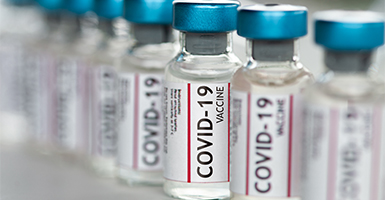Jean Boivin, Head of BlackRock Investment Institute together with Mike Pyle, Global Chief Investment Strategist, Elga Bartsch, Head of Macro Research and Scott Thiel, Chief Fixed Income Strategist, all part of the BlackRock Investment Institute, share their insights on global economy, markets and geopolitics. Their views are theirs alone and are not intended to be construed as investment advice.
Positive news on Covid vaccines gives us greater confidence that the economic restart can re-accelerate in 2021 – and that the cumulative activity loss from the virus shock will ultimately be a fraction of that seen after the global financial crisis (GFC). We prefer to look through any market volatility generated by the virus resurgence and renewed restrictions over the challenging months ahead.

Sources: BlackRock Investment Institute, with data from Reuters News, November 2020. Notes: The green line shows the cumulative sum of the difference between actual U.S. GDP and where it would have been had it grown at its pre-GFC trend level (3.4% a year in nominal terms) from 2007onwards. The solid yellow line shows the total shortfall of U.S. GDP over two years from the last quarter of 2019, based on the median expectation from a Reuters poll of economists published on Sept. 25, 2020. The solid orange line shows our estimate for a hypothetical scenario of renewed tightening/lockdown measures. We assume trend growth after the two years, shown as the dotted lines. For illustrative purposes only. There is no guarantee that any forecasts made will come to pass. The hypothetical scenario is subject to significant limitations as the pandemic is evolving and we are still trying to understand the potential for more extensive activity shutdowns.
Traditional business cycle analysis doesn’t apply to the Covid shock, in our view. We see the latter as more akin to the shock of a natural disaster: With the vaccine news, we have even greater visibility on how the cumulative activity loss will likely be limited – just a fraction of that seen after the GFC in our estimate – even as we expect a renewed surge in infections and resulting restrictions to disrupt the restart in the near term. See the chart above. We are still months away from any vaccine being widely available. But the game changer is that we now know we are building a bridge to somewhere, providing more clarity for governments and companies about getting to the post-Covid stage. That will make it easier to absorb any near-term disappointments and have greater confidence in the restart plan. It should also help limit any economic scarring and justify deploying further policy support. Yet risks of retrenching fiscal policy too soon, especially in the U.S., look to be significant. Still, we see the vaccine development providing a constructive backdrop for risk assets as we approach 2021.
BlackRock’s portfolio managers and senior executives gathered virtually last week at our 2021 Outlook Forum to discuss what we see as a new investment order. The pandemic has accelerated transformations in our economies and societies across four dimensions – sustainability, inequality, geopolitics and the policy revolution. A tectonic shift toward sustainability was already under way, and the pandemic shone a spotlight on some underappreciated environmental, social and governance (ESG) factors such as employee safety and supply chain integrity.
The pandemic is also accelerating geopolitical trends that were already in motion – such as the shift toward a bipolar U.S.-China world order and a remapping of global supply chains. A simple way to think about it: The global economy is recalibrating from a single-minded focus on cost efficiency and short-term profitability to a system that puts greater weight on long-term resilience. Reduced global specialization could result in higher production costs, in our view.
The inflation outlook was at the center of our debates. The pandemic has spurred new structural trends such as a policy revolution that sees greater coordination between fiscal and monetary policy. Central banks are showing an increased tolerance for inflation overshoots after persistent inflation undershoots, and the fiscal-monetary coordination is leading to political pressure to keep interest rates low even amid rising price pressure. Together with rising production costs stemming from the remapping of global supply chains and more focus on sustainability, this points to a higher inflation regime over the medium term. This is a shift that markets are not prepared for, even though in the near term corporates’ cost-cutting effort may help mitigate some price pressure.
Investors need to adapt their portfolios to these accelerated trends, including higher inflation in the medium term. These views reinforce our strategic underweight in nominal bonds and preference for inflation-linked debt, as well as our belief that allocations to Asia’s growth engine and private markets will be crucial for delivering real diversification in the post-Covid world. We also favor sustainable assets as we see sustainability becoming the fundamental source of portfolio resilience. Even with a vaccine on the way there are major sectoral implications as the Covid shock creates structural winners and losers. We see big tech companies likely maintaining their high margins under a divided U.S. government and airlines among the potential losers as business travel recovers only slowly. Stay tuned for our 2021 Global outlook.
Market Updates

Past performance is not a reliable indicator of current or future results. It is not possible to invest directly in an index. Sources: BlackRock Investment Institute, with data from Refinitiv Datastream, November 2020. Notes: The two ends of the bars show the lowest and highest returns at any point this year to date, and the dots represent current year-to-date returns. Emerging market (EM), high yield and global corporate investment grade (IG) returns are denominated in U.S. dollars, and the rest in local currencies. Indexes or prices used are: spot gold, Datastream 10-year benchmark government bond (U.S. , German and Italy), MSCI USA Index, Bank of America Merrill Lynch Global Broad Corporate Index, MSCI Emerging Markets Index, J.P. Morgan EMBI index, Bank of America Merrill Lynch Global High Yield Index, the ICE U.S. Dollar Index (DXY), MSCI Europe Index and spot Brent crude.
Market backdrop
The positive vaccine news triggered a sharp rotation into value and small-cap equities that fizzled later in the week when near-term virus concerns returned to the fore. Effective vaccines would allow a broader opening-up of activity sooner and reduce the risk of long-term scarring, in our view. Yet we do see potential for near-term disruption to the economic restart caused by the ongoing virus resurgence and government restrictions.
Week Ahead
- November 16: China industrial output, retail sales
- November 17: U.S. industrial production
- November 19: Federal Reserve Bank of Philadelphia November Manufacturing Business Outlook Survey
- November 20: Japan Jibun Bank Flash composite purchasing managers’ index (PMI)
Manufacturing data this week will be in focus. China’s industrial output likely grew for the seventh consecutive month in October, according to a Reuters poll, as the country’s economic recovery is well underway. U.S. manufacturing data may not reflect the impact from the virus resurgence yet, but we see downside risks to the activity restart in coming months if lockdown measures tighten.
BlackRock’s Key risks & Disclaimers:
This material is not intended to be relied upon as a forecast, research or investment advice, and is not a recommendation, offer or solicitation to buy or sell any securities or to adopt any investment strategy. The opinions expressed are as of November 16th, 2020 and may change. The information and opinions are derived from proprietary and non-proprietary sources deemed by BlackRock to be reliable, are not necessarily all-inclusive and are not guaranteed as to accuracy. As such, no warranty of accuracy or reliability is given and no responsibility arising in any other way for errors and omissions (including responsibility to any person by reason of negligence) is accepted by BlackRock, its officers, employees or agents. This material may contain ’forward looking’ information that is not purely historical in nature. Such information may include, among other things, projections and forecasts. There is no guarantee that any forecasts made will come to pass. Reliance upon information in this material is at the sole discretion of the reader.
The information provided here is neither tax nor legal advice. Investors should speak to their tax professional for specific information regarding their tax situation. Investment involves risk including possible loss of principal. International investing involves risks, including risks related to foreign currency, limited liquidity, less government regulation, and the possibility of substantial volatility due to adverse political, economic or other developments. These risks are often heightened for investments in emerging/developing markets or smaller capital markets.
Issued by BlackRock Investment Management (UK) Limited, authorized and regulated by the Financial Conduct Authority. Registered office: 12 Throgmorton Avenue, London, EC2N 2DL.
MeDirect Disclaimers:
This information has been accurately reproduced, as received from BlackRock Investment Management (UK) Limited. No information has been omitted which would render the reproduced information inaccurate or misleading. This information is being distributed by MeDirect Bank (Malta) plc to its customers. The information contained in this document is for general information purposes only and is not intended to provide legal or other professional advice nor does it commit MeDirect Bank (Malta) plc to any obligation whatsoever. The information available in this document is not intended to be a suggestion, recommendation or solicitation to buy, hold or sell, any securities and is not guaranteed as to accuracy or completeness.
The financial instruments discussed in the document may not be suitable for all investors and investors must make their own informed decisions and seek their own advice regarding the appropriateness of investing in financial instruments or implementing strategies discussed herein.
If you invest in this product you may lose some or all of the money you invest. The value of your investment may go down as well as up. A commission or sales fee may be charged at the time of the initial purchase for an investment and may be deducted from the invested amount therefore lowering the size of your investment. Any income you get from this investment may go down as well as up. This product may be affected by changes in currency exchange rate movements thereby affecting your investment return therefrom. The performance figures quoted refer to the past and past performance is not a guarantee of future performance or a reliable guide to future performance. Any decision to invest in a mutual fund should always be based upon the details contained in the Prospectus and Key Investor Information Document (KIID), which may be obtained from MeDirect Bank (Malta) plc.

